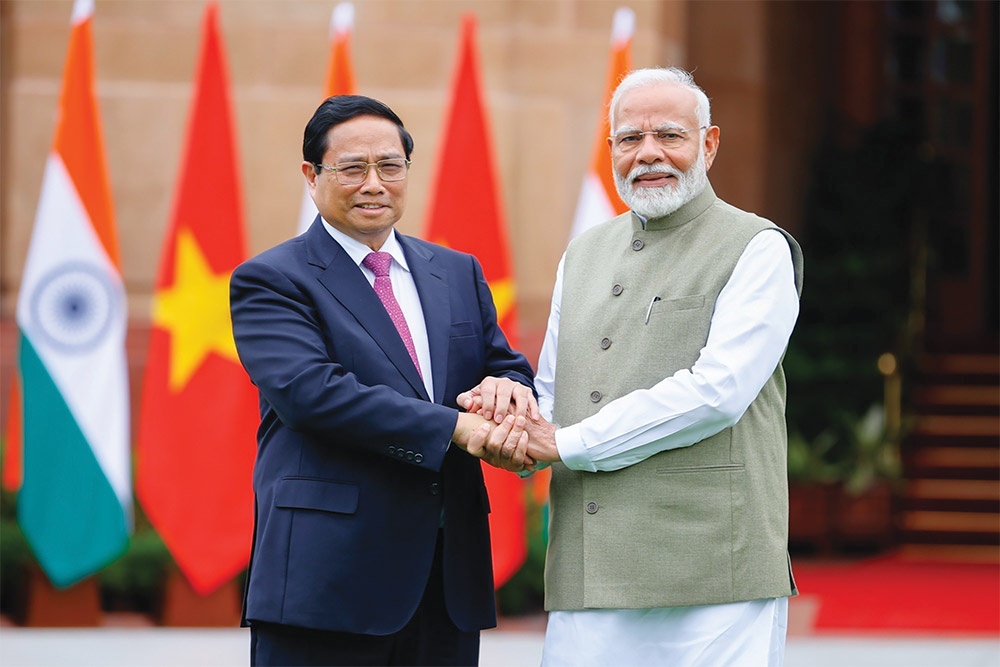India and Vietnam pledge to boost trade
 |
| Prime Minister Pham Minh Chinh and Indian counterpart Narendra Modim, Photo: VNA |
During last week’s state visit to India by Vietnamese Prime Minister Pham Minh Chinh, both nations have committed to expand their bilateral ties in science and technology, especially in core technology, semiconductors, AI, innovation, and exploitation and processing of rare earth materials.
They have also pledged to intensify cooperation in IT development and training IT human resources in their respective countries, with a direction towards establishing a forum about, and signing, a digital partnership.
To this end, both sides pledged to create better conditions for bilateral trade and mutual investment, with Vietnam suggesting the early signing of a bilateral free trade agreement.
Statistics from the Ministry of Industry and Trade revealed that in the first six months of this year, total trade between Vietnam and India reached $7.13 billion, up from $6.7 billion in the same period last year. This includes Vietnam’s exports of $4.3 billion, a 10.4 per cent increase on-year, and India’s exports of $2.83 billion, down 10.2 per cent on-year.
In 2023, the total bilateral trade reached $14.5 billion. India’s main exports to Vietnam include metals, machinery, electronics, and agricultural products. Vietnam exported various products to India, such as electronic equipment, chemicals, machinery, and animal feed.
Currently, the ASEAN-India Trade in Goods Agreement of 2009 (AITIGA) is under review, with completion expected next year to enhance the trade regime between the two countries. The new version of AITIGA is anticipated to diversify trade and bring symmetry to bilateral trade between ASEAN countries and India. The ministers have agreed to a quarterly negotiation schedule by the joint committee to conclude the review in 2025. Under the existing deal, ASEAN members and India have agreed to open their markets by progressively reducing duties on 76.4 per cent of goods and liberalising tariffs on over 90 per cent of goods.
According to the ASEAN Secretariat, the new version aims to provide more convenience for businesses of the participating economies, thereby increasing trade and investment cooperation between India and Vietnam and between India and other ASEAN member states.
The Indian Embassy in Vietnam expects that many Indian companies will benefit from the upgrade, enabling them to engage more in the Vietnamese market, which they see as having great potential.
Figures from the Ministry of Planning and Investment show that, as of July 20, India had 413 valid ventures in Vietnam, with a total registered capital of more than $1 billion.
A number of large Indian groups are interested in investing in Vietnam in various sectors, including infrastructure and renewable energy, with Adani Group being the most prominent. Adani is planning to strengthen cooperation with Vietnamese partners in the fields of aviation and logistics, via the construction of Long Thanh International Airport and Chu Lai Airport.
Adani has invested in Lien Chieu Port in Vietnam’s central city of Da Nang with about $2 billion. Adani Group has also invested in two projects in Vietnam, both in the renewable energy sector: its Phuoc Minh wind power plant and Phuoc Minh solar plant. It is reported that Adani also wants to engage in other energy projects in the central province of Binh Thuan, specifically Vinh Tan 3 Thermal Power Plant with a total investment of around $2.8 billion.
India’s BDR Pharmaceuticals wants to cooperate with local firms to produce cancer treatment drugs and set up a radiation and chemotherapy data centre in Vietnam.
BDR chairman Dharmesh Shah told PM Chinh last week that the drugs BDR wants to make in Vietnam would have less side effects than those currently sold in the market. BDR, established in 2002, is the biggest manufacturer of cancer drugs in India with an 80 per cent market share. It is reported to have posted $250 million in revenues and $90 million in profits last year.
Deputy Minister of Foreign Affairs Pham Thanh Binh said last week that Vietnam and India have great potential to boost bilateral cooperation in trade and investment, thanks to their large populations and dynamic economic development.
“VinFast has commenced construction of a vehicle manufacturing plant in Tamil Nadu of India, with a total registered capital of $2 billion. India’s major groups are boosting cooperation with Vietnamese partners in many strategic sectors such as renewable energy, manufacturing and processing, oil and gas, pharmaceuticals, seaport infrastructure, and logistics,” Binh said.
For example, Tata Power, Bharat Electronics, and Ion Exchange are considering projects in communications, infrastructure, waste management, and renewable energy sectors. Moreover, the Bank of India, present in Ho Chi Minh City for eight years, is expanding banking and financial services to businesses and individuals, focusing on India and Vietnam.
According to the Indian Embassy, hundreds of Indian businesses in Vietnam are creating economic value in sectors such as consumer goods, vehicle sub-systems, sugar and coffee, IT services, mineral processing, hydrocarbons, garments, engineering goods, and services such as aviation, banking, food, and tourism.
What the stars mean:
★ Poor ★ ★ Promising ★★★ Good ★★★★ Very good ★★★★★ Exceptional
Related Contents
Latest News
More News
- Hermes joins Long Thanh cargo terminal development (February 04, 2026 | 15:59)
- SCG enhances production and distribution in Vietnam (February 04, 2026 | 08:00)
- UNIVACCO strengthens Asia expansion with Vietnam facility (February 03, 2026 | 08:00)
- Cai Mep Ha Port project wins approval with $1.95bn investment (February 02, 2026 | 16:17)
- Repositioning Vietnam in Asia’s manufacturing race (February 02, 2026 | 16:00)
- Manufacturing growth remains solid in early 2026 (February 02, 2026 | 15:28)
- Navigating venture capital trends across the continent (February 02, 2026 | 14:00)
- Motivations to achieve high growth (February 02, 2026 | 11:00)
- Capacity and regulations among British areas of expertise in IFCs (February 02, 2026 | 09:09)
- Transition underway in German investment across Vietnam (February 02, 2026 | 08:00)

 Tag:
Tag:




















 Mobile Version
Mobile Version